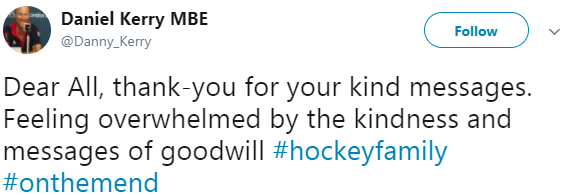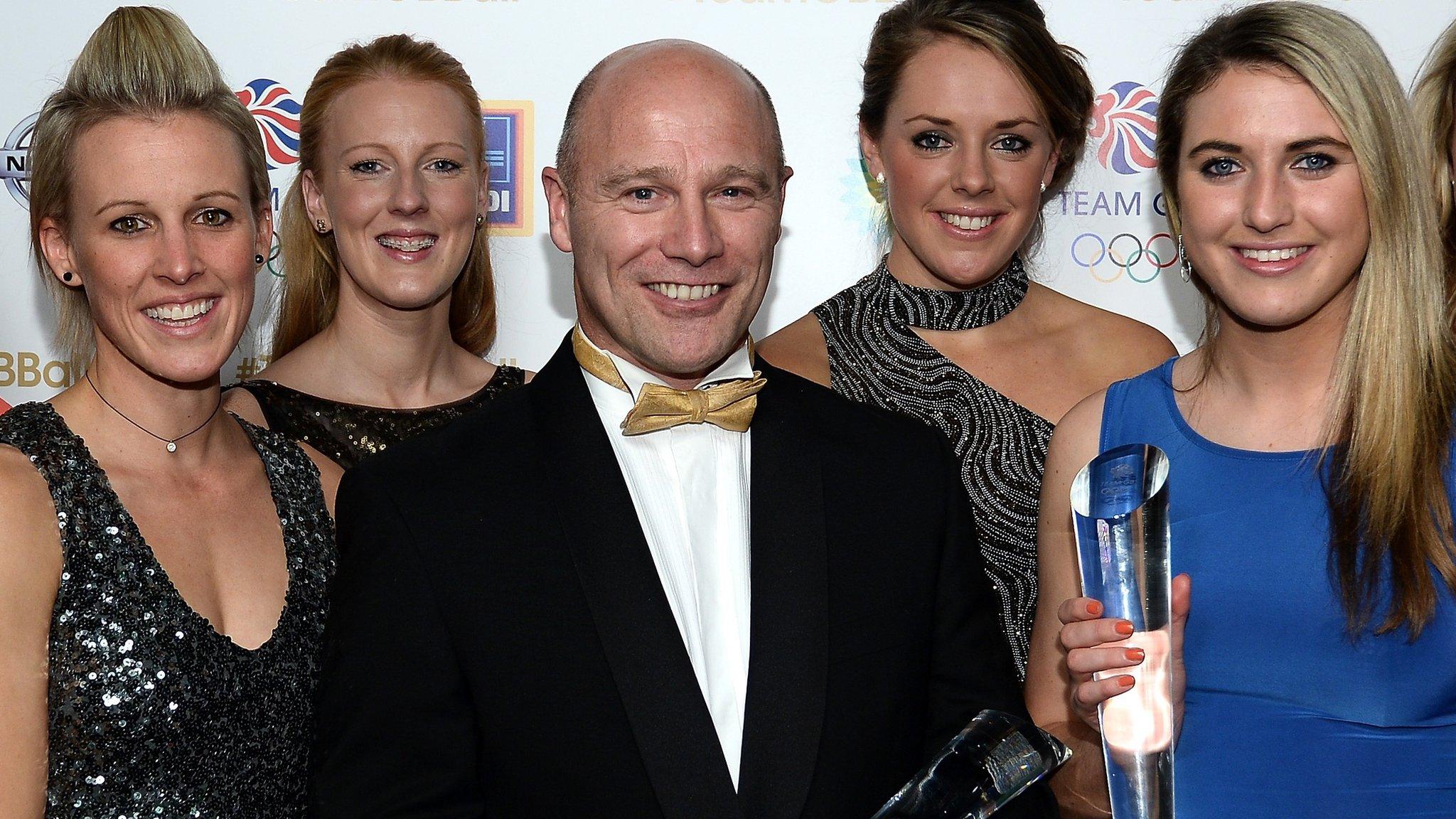Danny Kerry: Olympic winning coach - from heart attack to further hockey history?
- Published
I was worried my kids may not have a dad – Kerry on heart attack
It was 3am in Johannesburg, on Saturday, 15 July and GB women's hockey head coach Danny Kerry was not only awake, but in pain - "a lot of pain".
Sleepless nights are not uncommon for Olympic gold medal-winning master tacticians like Kerry - particularly during an event like the World League Semi-Finals in South Africa, which the team were midway through competing in.
But rather than contemplate how to follow up their 1-0 defeat of Germany just hours earlier, he was about to begin the biggest off-field fight of his life.
Kerry had tried to ignore a growing pain in his chest and left arm for two hours - telling himself 'you don't feel like you're going to die', but he grew increasingly concerned as the discomfort failed to subside.
A call to the GB team doctor - Cath Lester - followed and he was soon admitted into hospital, where tests confirmed the 46-year-old had suffered a heart attack.
"Prior to surgery it was pretty scary and I did have a particularly dark moment thinking, 'what will happen, will I come out of this?'" Kerry told BBC Sport.
"I was really concerned about my immediate family, my wife Lisa, the two kids - Anna and Orla - and whether they'd have a dad."
In a wide-ranging interview Kerry reveals how his condition came as a "massive shock" but that now - after returning to full-time work last week - he feels he can lead the British women to a defence of their Olympic crown at Tokyo 2020.
Kerry a cardiac ward 'freak show'

Several of the GB team were allowed to visit Kerry in hospital before he returned to the UK
After arrival in hospital Kerry required two separate blood tests before the heart attack was confirmed, while a separate angiogram diagnosed a blocked artery as the cause.
He spent three days in intensive care where his condition was stabilised before being offered the option to return to the UK for surgery or to have the procedure in South Africa.
"Initially I wanted to go back home to be with my family, but I was advised that statistically it [the survival rate] was better not to delay," said Kerry, who's wife was flown out to be with him before the procedure.
He did manage a video call to his children - who were four and six at the time - back in the UK, but said "trying to make it a positive environment for them" was one of the hardest moments of his life.
"It was really tough because you're putting on a very brave face for them and trying to smile and laugh when you're not feeling like it so much," he said.
Five days after being admitted to hospital Kerry was fitted with three metal 'stents' in his heart, but he began impressing the doctors from the moment he woke who were astounded by his rapid recovery.
"I was a bit of a freak show in the cardiac care unit in Johannesburg as they kept coming and checking on this young guy who looks on the surface really healthy," said the Bisham-based coach.
"The consultant told me 'you're as fit as a fiddle, you've come through this really well' - so the whole situation seemed as much of a shock to them as it was to me."
To further boost his morale several of the GB team were allowed to visit him in hospital before he returned to the UK.
While Kerry had been criticised for his 'grumpy' attitude towards the British players during the 2008 Beijing Olympics, he had taken on board the "harrowing" feedback, external and over the following eight years become a much-loved coach.
"It was a brilliant moment because I wasn't a hockey coach anymore, it was just people looking out for one another," said Kerry, who guided the GB women to their first hockey gold at Rio 2016.
Olympic champion Susannah Townsend was part of the British squad competing in South Africa, but was unable to attend the hospital as she was suffering from a cold and wanted to minimise the risk of Kerry developing illness.
"I've known him for 13 years so it was a real shock for us all and really difficult for me personally," said the player after the team finished third at the World League Semi-Finals.
"Danny didn't want his situation to be a distraction during the event and he didn't want us to 'win for him' but it was in the back of our minds."
The 'new' Danny Kerry

Kerry changed his diet after his surgery, with the help of Kate Richardson-Walsh
Why the relatively fit - and regular cyclist - Kerry suffered a heart attack is still relatively unclear, but the coach has attempted to transform some elements of his life to minimise the stresses which potentially played a role in the condition.
"The health service here have been brilliant but are still a bit bemused because my risk factor for something like this is incredible low," said Kerry, who has lost more than 6kg since surgery.
"I've had time to reflect on my life and work over the last couple of months and I'm now incredibly fastidious about what I eat - I don't touch anything with any saturated fat in it at all."
Olympic gold medal-winning hockey captain Kate Richardson-Walsh, who retired after the team's historic gold in Rio, helped facilitate that change with a special delivery for Kerry.
"I managed to get a whole package of Quorn sent to him to make sure he was eating healthily," said Richardson-Walsh, who describes learning of Kerry's heart attack as "horrendous".
"He would go out on runs during tournaments so he was relatively fit, but he's lost so much weight now and his diet has really changed so hopefully he can look after his physical and mental wellbeing going forwards."
Kerry's children Anna and Orla have provided some light relief during his rehabilitation and transition into his 'new life'.

Kerry's children Anna and Orla have provided some light relief during his rehabilitation and transition into his 'new life'
"They know that I'm very diligent about what I eat now, so they'll be eating sausages and I'll be looking on enviously and my seven-year-old [Anna] goes 'sorry Daddy but I like sausages and I know you can't eat them' so there are funny moments," he said.
"Another time my four-year-old [Orla] was lying on my chest, giving me a cuddle and then jumps off, laughs and runs to the kitchen and goes 'mummy, mummy, daddy's heart isn't beating properly'.
"It was kind of funny and then not funny at the same time."
Enjoying family time is something Kerry says he now cherishes and appreciates much more.
"I spent my entire life looking backwards and looking forwards, never living in the moment," he says, when referring to how he hardly celebrated gold in Rio before contemplating a new challenge for the squad.
"I look back at how I've been out for nice meals with friends and family and on the surface it may look like I've been present, but in my head I'm thinking about things that have happened [in games] and about what I'm going to do next.
"I needed to change elements of that and make my life a bit more healthy."
Why continue?

GB women won a first Olympic hockey gold medal at Rio 2016, beating the Netherlands 2-0 in a penalty shootout
After achieving the sport's ultimate prize of Olympic gold - on top of previous European, Commonwealth and World League honours - Kerry could have been forgiven from walking away from the sport to focus on his health.
However, he is arguably more determined than ever to continue making history with the GB women's hockey team.
"It's really hard for some people to get their head around, but it isn't a job," says Kerry, who has transformed the fortunes of the squad since taking over in 2005.
"Yes you take a salary home but that's not the reason you do it - it's because of you're passionate about it and are surrounded by staff and athletes who want the best as well."
It may be fewer than three months since his surgery, but after working two days per week for the past month Kerry has now returned to full-time coaching with the GB team.
The squad are about to head into their busiest period outside of the Olympic year, with the World League Finals in New Zealand in November followed by the Gold Coast Commonwealth Games in Australia, in April.
The GB women will then return to the scene of their 2012 Olympic bronze medal-winning success as London hosts the World Cup from next July.
Does more history beckon in Tokyo?
Kerry takes daily medication to keep the metalwork in his heart "in-check" while he hopes cycling frequently as well as yoga and meditation will help 'reduce the stresses' at future events.
Having missed the team's European bronze campaign in August, while recovering from surgery, Kerry is eager to return to a "competitive tournament environment" and believes his new-look squad have "amazing potential".
"For me personally the next challenge after winning a [Olympic] gold medal is to do something even more special and achieve it again," says Kerry, who will have regular health check-ups in the years ahead.
"I have a really great life and a great opportunity to try for the even bigger challenge of winning again."
- Published26 July 2017
